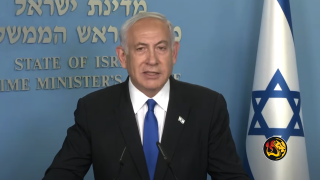
by Emmitt Barry, Worthy News Correspondent
(Worthy News) – During a press briefing to foreign media on Wednesday night, Israeli Prime Minister Benjamin Netanyahu reiterated his stance that Israel cannot abandon the 7.8 mile long Philadelphi Corridor along the Gaza-Egypt border without first implementing a viable plan to prevent weapons smuggling into the Gaza Strip.
Netanyahu stated that Israel could consider leaving the Philadelphi Corridor during Phase Two of a hostage deal, as part of discussions surrounding a permanent ceasefire. However, Netanyahu also stated “the conditions that we shall have for a permanent ceasefire must include a situation where the Philadelphi corridor cannot be perforated.”
However, Hamas has demanded that Israel withdraw from the Philadelphi Corridor and the rest of the Gaza Strip before Phase One can begin.
During the press conference, Netanyahu detailed how the Philadelphi Corridor “became completely porous” following Israel’s unilateral disengagement from the Gaza Strip in 2005. He explained that Hamas began smuggling weapons into Gaza through the corridor, “despite Egypt’s policy to prevent it.”
As a result of this smuggling, “rockets, missiles, drones, ammunition, weapons manufacturing equipment, and tunnel drilling tools all made their way into Gaza,” Netanyahu explained.
“Once we left the Philadelphi Corridor,” Netanyahu stated, “Iran could carry out its plan to turn Gaza into a base, a terrorist enclave, that would endanger not only the communities around it, but would endanger Tel Aviv, Jerusalem, and Beersheba.”
“You have to understand the centrality of the Philadelphi Corridor to the arming of Gaza, to the arming of Hamas,” Netanyahu emphasized.
Addressing proposals that weapons smuggling through the Philadelphi Corridor into Gaza could be stopped without an IDF presence, Netanyahu remarked, “Show me someone who can actually prove, not just on paper, not in words, not on a slide, but on the ground, day after day, week after week, month after month, that they can truly prevent the recurrence of weapons smuggling.”
Netanyahu added that if such a credible plan were presented, “we’re open to considering it. But I don’t see that happening… and until it does, we’re staying there.”
Addressing the suggestion that Israel could withdraw from the Philadelphi Corridor and return if necessary, Netanyahu responded, “When we want to come back [to Philadelphi], we’ll pay an exorbitant price in many fields,” including the potential loss of troops.
“We’re in now, [if] we leave, we won’t [be able to] come back. You know it. Everybody here knows it. Everyone knows the pressure that will be placed on us to prevent our return and the price we’ll have to pay if we try. It’s just not going to happen,” Netanyahu concluded.
Copyright 1999-2025 Worthy News. This article was originally published on Worthy News and was reproduced with permission.
Latest News from Worthy News
Anxiety remained among religious Jews observing the Shabbat in Melbourne after an arsonist set fire to the door of a synagogue, forcing worshipers to flee, while elsewhere in the Australian city, protesters stormed an Israeli restaurant.
A troubling trend is emerging across the United States: increasing acts of hostility, vandalism, and violence against Christian churches. From arson to bomb threats, these incidents reflect what some are calling a spiritual crisis and a growing cultural hostility toward Christianity.
A sudden and violent flash flood in the Texas Hill Country has left at least 24 people dead and dozens more missing–many of them young girls attending Camp Mystic, a beloved Christian summer camp–after relentless storms swelled the Guadalupe River early Friday morning, washing away cabins, homes, and vehicles in its path.
In a dramatic Independence Day spectacle at the White House, President Donald Trump signed into law the “One Big Beautiful Bill,” a sweeping legislative package that delivers on a wide array of his second-term promises and reshapes major sectors of the U.S. economy, tax system, and welfare programs.
Preparations are underway to establish a European Union-led alternative to the World Trade Organization (WTO) as part of a new global marketplace that would challenge America’s economic clout.
Ukrainian President Volodymyr Zelenskyy said late Friday that he spoke with U.S. President Donald J. Trump about the need to strengthen Ukraine’s air defense hours after Kyiv experienced its heaviest Russian air strikes since the outbreak of the war more than three years ago.
Britain has unveiled a controversial plan that will, in many cases, replace human doctors with Artificial Intelligence (AI).







